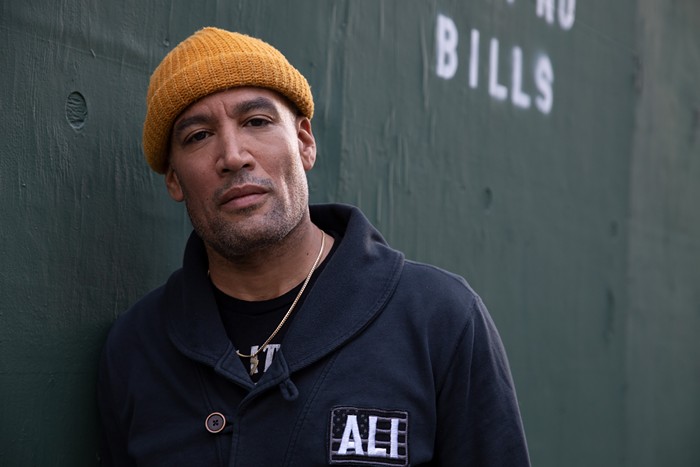"IT'S NOT THAT I don't think the apocalypse isn't possible or happening," says Dan Deacon. "It's that I'm not waiting for it. I'm not hoping that it'll occur."
Rather than running for the hills, Deacon decided to stay put. To engage. "I think as soon as someone becomes aware of a problem or situation that they themselves are a part of, they instantly have a responsibility to do something about it," Deacon says. "And that's sort of how I'm trying to change my life, my role within that system, and not expect someone else to change it for me."
Part of that meant changing the way he ate. "I have a lot of issues with food," say Deacon. "To me, that's my first step, that the food I get is grown or raised, farmed and delivered, and sold in a way that is similar to the way I would want to be treated."
Along with his tour-mates, Deacon rides in an old veggie-oil-converted school bus. Instead of having venues provide meals, the group opts for a buyout, which they use to stock the bus' kitchen with organic, locally grown fruits and vegetables.
"We make all of our own meals," Deacon says. "We always have dinners together. We make lunches and breakfasts, and always have snacks that aren't going to be future cancer cells. Every change you make starts to affect the other."
Since 2007, when he burst on the scene with the pounding, sharp, and glittering Spiderman of the Rings, Deacon's musical palate become similarly refined. Here, too, he's gone organic.
"The only track that has any samples on it is 'True Thrush,' Deacon says of his latest album, America. Deacon's embracing of live instrumentation began with 2009's Bromst, and America takes it further. "Any sound that could be achieved acoustically was," he says. In one instance Deacon layered a violin track 75 times.
"I'm really interested in different textures of sounds, which is what led me to electronics in the first place," Deacon says. "Obviously electronics and acoustic instruments have very different limitations, strengths, and weaknesses. And I'd been working so long with electronics and hadn't had much experience working with acoustic instruments that I wanted to dive into that world and utilize those timbres... the imperfections they create, the human performance, I find that beautiful."
While the hyperactive, metronomic, and player-piano-like pace of Deacon's earlier works remains, the live instrumentation—the drums in particular—gives America room to breathe. This vast, wide-open, airy sky is particularly important, as America is a concept album about the country itself.
As Deacon told NPR, "The music is definitely inspired by geography. You could really despise every aspect of what you think American culture is, but it's hard to deny that the land itself is beautiful."
America is evocative of the country's vast natural landscape, particularly on the 22-minute, four-song "USA" suite, which conveys a profound sense of movement—from the mountains to plains, the city to the big sky, cars whipping forward with the windows down and trains chugging on. To the middle of nowhere, sleeping beneath the stars.
Unlike Spiderman, which danced around disposable consumer culture, America exhibits a vastly wider emotional range. It is cultured, connected, and built to last. Deacon says. "If I had the same views I had five years ago, I'd be a little confused as to why I hadn't matured or mentally evolved."



















